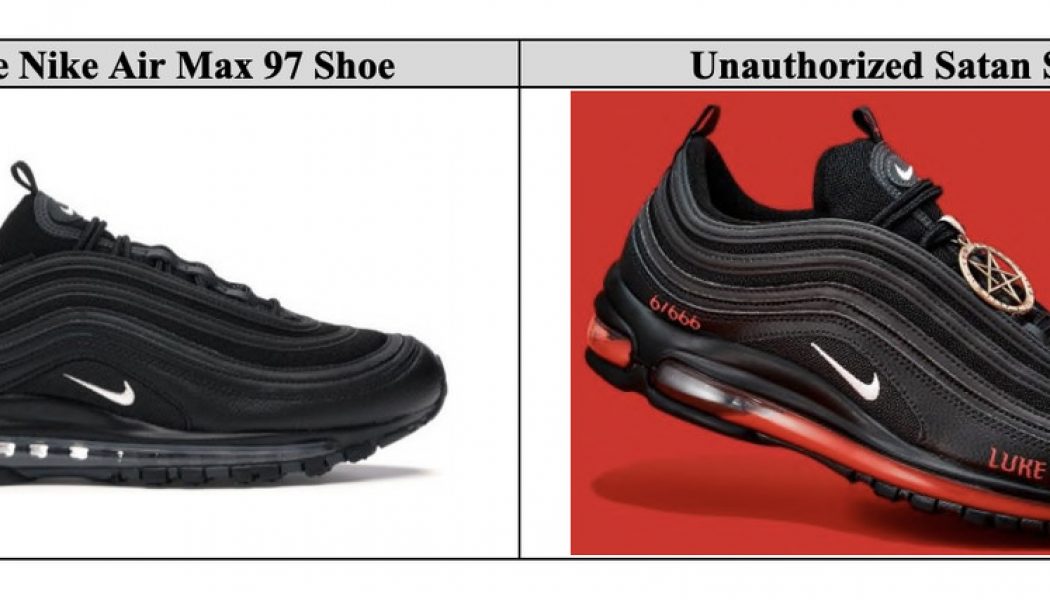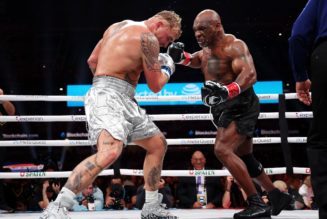Nike has sued internet collective MSCHF for selling “unauthorized Satan Shoes” in collaboration with rapper Lil Nas X. The shoe company says MSCHF infringed on its trademarks by selling limited-edition custom Nikes that were allegedly modified with a drop of human blood. Since the Satan Shoes (as they are officially called) were announced last week, Nike claims they’ve harmed its reputation, “including among consumers who believe that Nike is endorsing satanism.” It’s asking for the shoes to be destroyed and for MSCHF to pay financial damages.
MSCHF is known for stunt products like its 2019 “Jesus Shoes,” a $1,425 pair of white Nike Air Max 97s with custom stitching and 60ccs of water from the River Jordan. Nike didn’t object to the Jesus Shoes. But it’s apparently less happy with their theological inverse: a 666-pair drop of $1,018 red and black Air Max 97s, containing 60ccs of ink and one drop of human blood, embellished with a pentagram.
Nike’s suit makes a few general arguments against modifying shoes, including that “making changes to the midsole may pose safety risks for consumers.” (These shoes stand accused of putting people’s souls and their soles at risk.) But it mostly argues that a satanic shoe containing literal blood is bad for Nike’s brand.
MSCHF x Lil Nas X “Satan Shoes”
Nike Air Max ’97
Contains 60cc ink and 1 drop of human blood
️666 Pairs, individually numbered
$1,018
️March 29th, 2021 pic.twitter.com/XUMA9TKGSX— SAINT (@saint) March 26, 2021
To make its case, Nike cites social media comments from people who don’t realize MSCHF was just unofficially reselling the shoes. “Won’t buy Nike again. You are banned!” says one. “This is sickening!!! How is Nike not involved when there’s a Nike symbol on the shoe!!!” says another. “MSCHF is deceiving consumers into believing that Nike manufactures or approves of the Satan Shoes,” Nike’s complaint claims. “Consumers’ belief that the Satan Shoes are genuine Nike products is causing consumers to never want to purchase any Nike products in the future.”
As University of New Hampshire law professor Alexandra Roberts noted on Twitter, MSCHF can defend itself on multiple grounds. It can cite the First Sale Doctrine, which protects reselling goods that are protected by intellectual property laws — like people selling designer clothes on Poshmark, for instance. It can also claim the shoes are protected as a parody or argue that buyers are unlikely to confuse these modified Satan Shoes with off-the-shelf Nikes, random internet commenters notwithstanding.
Very, very few people will ever own a $1,000 blood-and-pentagram sneaker. If the case goes to trial, though, there’s more than a limited-edition satanic shoe line at stake. “The case has potentially broad implications because we’re seeing a rise in this kind of customization of branded goods as well as upcycling,” Roberts told The Verge via email.
:no_upscale()/cdn.vox-cdn.com/uploads/chorus_asset/file/22406803/Screen_Shot_2021_03_29_at_7.20.44_PM.png)
It’s fine to directly resell products, Roberts says, and it’s legal to advertise goods while mentioning somebody else’s trademark. You can also do things like dismember Barbie dolls and sell pictures of them as art. “But what about the businesses making jewelry out of authentic Chanel buttons, or cutting fringes into genuine Vuitton bags?” Earlier this year, in fact, Chanel sued a company for “misappropriating” its brand for recycled button earrings.
Basically, MSCHF bought shoes that it could legally resell using Nike’s branding, but it heavily modified them into what’s arguably a new product whose quality Nike can’t control, then sold them as a commercial good rather than a traditional art piece. Depending on how a court weighs all those factors, it could create a precedent for future cases. “I think other high fashion brands will be keeping a close eye on this case,” Roberts says.
The Satan Shoes dropped alongside a provocative Lil Nas X music video that’s drawn the ire of conservative commentators. So it makes sense that Nike might distance itself. But as The Fashion Law notes, MSCHF has anticipated and even invited lawsuits in the past, saying a suit would “help increase the value of the product.” By taking it to court, Nike is almost certainly boosting the profile of MSCHF’s latest drop, as well as potentially causing new problems.
“I’m not shocked Nike chose to sue, but I think they might also want to proceed with caution to avoid being perceived as squelching speech or siding with the Christian right over a popular Black artist,” says Roberts. “I expect Nike might be hoping for a quick, low-key settlement in which MSCHF agrees not to ship out the shoes.”
:no_upscale()/cdn.vox-cdn.com/uploads/chorus_asset/file/22406838/Screen_Shot_2021_03_29_at_7.46.16_PM.png)
MSCHF didn’t immediately respond to a request for comment. Lil Nas X, who posted a prank “apology” video for the shoes yesterday, is not named as a defendant in the suit.










